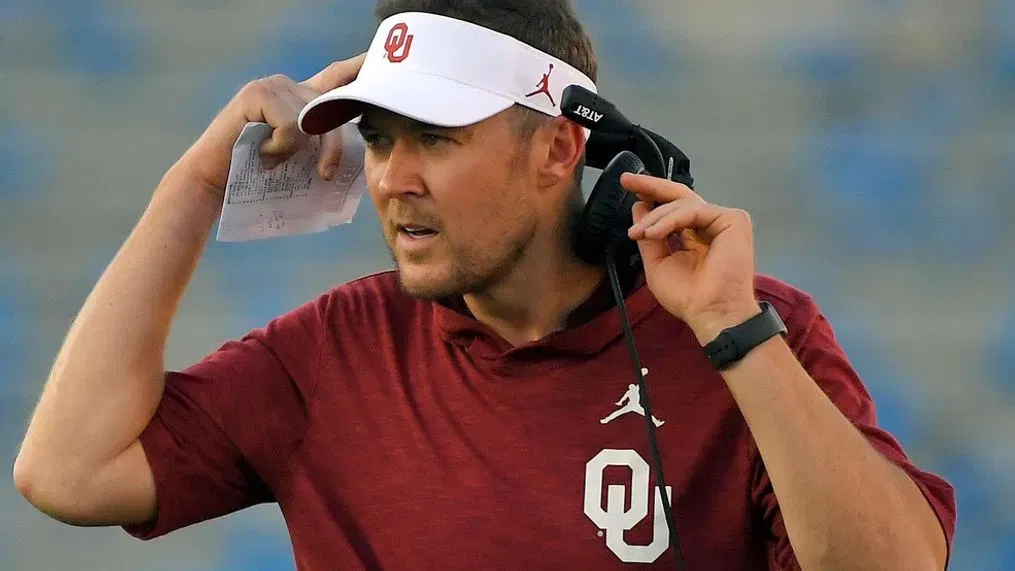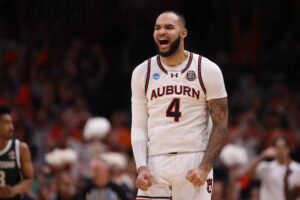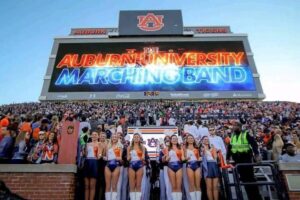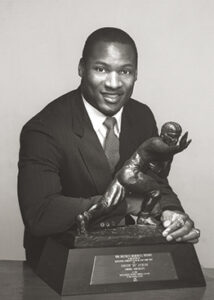
Congratulations to Lincoln Riley: A Renowned Coach Who Changed the Course of Oklahoma Sooners’ History
Lincoln Riley’s name has become synonymous with the Oklahoma Sooners football program and has etched itself into the annals of college football history. His arrival in Norman, Oklahoma, was more than just a changing of the guard; it marked a transformation of the football culture at one of the most storied programs in NCAA history. Over the course of his tenure as the head coach of the Oklahoma Sooners, Riley revolutionized the program in ways that would not only shape the future of Oklahoma football but would also leave an indelible mark on the broader landscape of college football.
Born on September 5, 1983, in Lubbock, Texas, Lincoln Riley came from a football family, with his father being a coach. Riley’s early exposure to the sport and his keen football IQ quickly distinguished him as a rising star. After his playing career as a quarterback at Texas Tech, Riley began his coaching career, which led him to Oklahoma in 2015, where his path to success would take a meteoric rise.
Before becoming the head coach of the Oklahoma Sooners, Riley’s coaching journey was largely shaped by his time at East Carolina University (ECU), where he served as the offensive coordinator. Riley’s offense at ECU became well-known for its uptempo pace and potent passing attack, and it was there that he earned a reputation as a rising star in the coaching ranks.
However, it wasn’t until he joined the Oklahoma Sooners’ staff in 2015 that his true impact began to be realized. Riley’s initial role was as the offensive coordinator under head coach Bob Stoops. Stoops, a legendary coach who had led the Sooners to multiple Big 12 championships and a national title in 2000, recognized Riley’s potential early on. The Sooners’ offense, led by Riley, became one of the most potent and explosive in the nation.
Riley’s offensive philosophy was grounded in modern, high-powered schemes that capitalized on the evolution of the game. His uptempo offense featured dynamic quarterback play, fast-paced drives, and a system that made full use of skilled playmakers across the field. The Sooners’ offense under Riley was consistently among the best in the country, and the team’s success was a testament to his ingenuity and ability to connect with his players.
In 2017, after Bob Stoops’ sudden retirement, Lincoln Riley was promoted to head coach of the Oklahoma Sooners. The move was met with some skepticism due to Riley’s relatively short tenure as an assistant coach and his age—he was just 33 years old at the time. However, Riley’s appointment would prove to be a masterstroke. His age and fresh perspective on the game allowed him to relate to his players in ways few others could, and his innovative offensive approach revitalized the Sooners’ program.
In his first season as head coach, Riley quickly demonstrated his prowess. The Sooners finished with an impressive 12-2 record and won the Big 12 Championship, marking a perfect start to his head coaching career. Riley’s ability to maintain Oklahoma’s success under his leadership was immediately apparent. More importantly, he was able to build upon the foundation laid by Stoops, blending the program’s rich traditions with his own innovative style.
Under Riley, Oklahoma continued to be a perennial contender in the College Football Playoff conversation. His teams were always well-prepared, competitive, and exciting to watch, and Riley was regarded as one of the brightest young minds in the sport. The Sooners became known for their offensive fireworks, and Riley became the face of the program.
At the heart of Riley’s transformation of the Oklahoma Sooners was his revolutionary approach to offensive football. In the modern era of college football, the game has become increasingly focused on speed, pace, and scoring ability. Riley fully embraced this trend, creating one of the most potent and explosive offenses the sport had ever seen. His ability to adapt to changes in the game, particularly in terms of the quarterback position, allowed his offenses to consistently rank among the best in the country.
Riley’s offenses were built around a dynamic passing game that featured both a powerful deep ball and a quick-strike short-passing attack. But it wasn’t just about the passing game; his offenses were versatile, with a running game that kept defenses on their heels. The offensive line was developed to operate in sync with Riley’s fast-paced attack, and his ability to mold quarterbacks into Heisman-caliber players became one of his trademarks.
One of the hallmarks of Lincoln Riley’s tenure as head coach was his ability to develop elite quarterbacks. In fact, Riley is perhaps most famous for producing three consecutive Heisman-winning quarterbacks: Baker Mayfield (2017), Kyler Murray (2018), and Jalen Hurts (2019). These players not only thrived under Riley’s tutelage but also became emblematic of his offensive system’s success.
Baker Mayfield’s 2017 Heisman season was perhaps one of the most memorable in recent college football history. Under Riley’s guidance, Mayfield flourished as a dual-threat quarterback with the ability to make every throw on the field. He was the engine that drove Oklahoma’s offense, and his success in Riley’s system solidified the coach’s reputation as a quarterback whisperer.
The following year, Kyler Murray took the reins at quarterback and continued the tradition of excellence. Murray’s Heisman-winning season in 2018 was one for the ages. The Oklahoma offense under Riley was unstoppable, and Murray’s ability to extend plays with his legs while making precise throws from the pocket made him one of the most electrifying players in the country. His success further cemented Riley’s reputation as a master of offensive strategy and quarterback development.
In 2019, Jalen Hurts, a transfer from Alabama, continued the trend of Heisman-caliber quarterback play under Riley. While Hurts did not win the Heisman that year, his performance was still remarkable. Hurts brought a unique skill set to the table, combining his experience with his ability to run the football while also improving as a passer under Riley’s tutelage. His leadership and playmaking ability helped Oklahoma continue its dominance in the Big 12.
Riley’s ability to cultivate these quarterbacks was not merely a product of his offensive scheme but of his leadership, mentoring, and attention to detail. Each of these quarterbacks had their own strengths, but Riley found a way to maximize those talents and elevate the Sooners’ offensive performance to unprecedented heights.
Under Lincoln Riley, the Oklahoma Sooners became a dominant force in the Big 12 Conference. Riley led the Sooners to four consecutive Big 12 Championships (2017–2020), a feat that exemplified the sustained excellence of the program during his tenure. Oklahoma consistently found itself in the College Football Playoff conversation, and the Sooners’ ability to outscore opponents became a hallmark of the Riley era.
Though the Sooners were often regarded as one of the best teams in college football, the program faced challenges on the national stage. Despite their offensive prowess, Oklahoma struggled in the College Football Playoff, with losses to Georgia (2017), Alabama (2018), and LSU (2019). While these playoff appearances were significant achievements in and of themselves, the inability to capture a national championship would eventually be one of the program’s key hurdles under Riley’s leadership.
Despite these playoff setbacks, Riley’s tenure at Oklahoma cemented the program as one of the most respected in college football. He consistently brought Oklahoma back to national relevance and made the Sooners a feared opponent for any team on their schedule. Riley’s coaching prowess, particularly his offensive innovations, were admired across the nation, and he became a fixture in discussions about the best head coaches in college football.
While Riley’s tenure at Oklahoma was characterized by immense success, it ultimately led to his departure from the program. In November 2021, Riley made the decision to leave Oklahoma for the head coaching job at the University of Southern California (USC). This move marked the end of an era in Oklahoma football, but it also signaled the beginning of a new chapter for both Riley and the Sooners.
As of now, Riley’s legacy at Oklahoma remains secure. He is remembered for his innovation, leadership, and ability to build a team capable of competing for championships year in and year out. Riley transformed Oklahoma from a program that was already elite into a modern football powerhouse with an offense that became the envy of college football. His impact on the program is undeniable, and his contributions to the sport have left a lasting mark.
Looking ahead, the future of Oklahoma football remains bright, as the program continues to search for its next leader to guide it to greater heights. But no matter who takes the reins next, Lincoln Riley’s influence will continue to be felt for years to come. His ability to adapt to the ever-evolving landscape of college football, his success in developing quarterbacks, and his unmatched offensive mind will be a standard by which future generations of Oklahoma coaches are measured.
In conclusion, Lincoln Riley’s time at the University of Oklahoma was a period of remarkable success, transformation, and excitement. He rewrote the offensive playbook, developed three Heisman-winning quarterbacks, and led the Sooners to multiple conference championships. Riley’s tenure in Norman, Oklahoma, will be remembered as a golden era in the program’s history, and his legacy will undoubtedly continue to shape the future of college football. Congratulations to Lincoln Riley for all of his accomplishments, and for his lasting impact on the Oklahoma Sooners football program and the sport as a whole.





